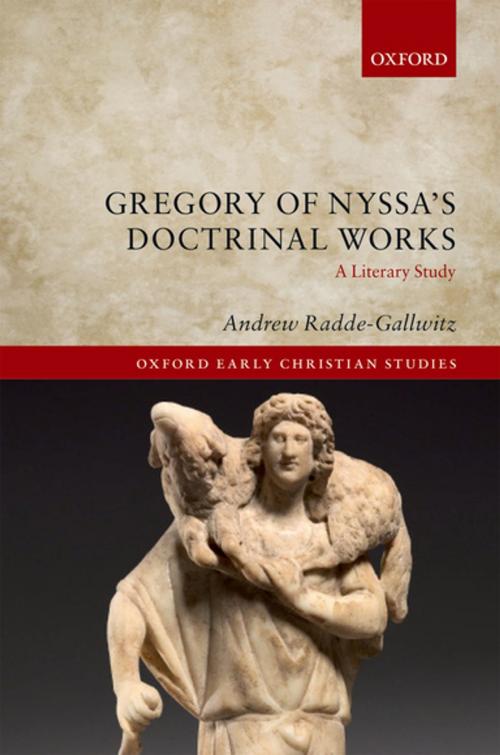Gregory of Nyssa's Doctrinal Works
A Literary Study
Nonfiction, Religion & Spirituality, Theology, Christianity, Church| Author: | Andrew Radde-Gallwitz | ISBN: | 9780192536129 |
| Publisher: | OUP Oxford | Publication: | May 24, 2018 |
| Imprint: | OUP Oxford | Language: | English |
| Author: | Andrew Radde-Gallwitz |
| ISBN: | 9780192536129 |
| Publisher: | OUP Oxford |
| Publication: | May 24, 2018 |
| Imprint: | OUP Oxford |
| Language: | English |
Gregory of Nyssa is firmly established in today's theological curriculum and is a major figure in the study of late antiquity. Students encounter him in anthologies of primary sources, in surveys of Christian history and perhaps in specialized courses on the doctrine of the Trinity, eschatology, asceticism, or the like. Gregory of Nyssa's Doctrinal Works presents a reading of the works in Gregory's corpus devoted to the dogmatic controversies of his day. Andrew Radde-Gallwitz focuses as much on Gregory the writer as on Gregory the dogmatic theologian. He sets both elements not only within the context of imperial legislation and church councils of Gregory's day, but also within their proper religious context-that is, within the temporal rhythms of ritual and sacramental practice. Gregory himself roots what we call Trinitarian theology within the church's practice of baptism. In his dogmatic treatises, where textbook accounts might lead one to expect much more on the metaphysics of substance or relation, one finds a great deal on baptismal grace; in his sermons, reflecting on the occasion of baptism tends to prompt Trinitarian questions.
Gregory of Nyssa is firmly established in today's theological curriculum and is a major figure in the study of late antiquity. Students encounter him in anthologies of primary sources, in surveys of Christian history and perhaps in specialized courses on the doctrine of the Trinity, eschatology, asceticism, or the like. Gregory of Nyssa's Doctrinal Works presents a reading of the works in Gregory's corpus devoted to the dogmatic controversies of his day. Andrew Radde-Gallwitz focuses as much on Gregory the writer as on Gregory the dogmatic theologian. He sets both elements not only within the context of imperial legislation and church councils of Gregory's day, but also within their proper religious context-that is, within the temporal rhythms of ritual and sacramental practice. Gregory himself roots what we call Trinitarian theology within the church's practice of baptism. In his dogmatic treatises, where textbook accounts might lead one to expect much more on the metaphysics of substance or relation, one finds a great deal on baptismal grace; in his sermons, reflecting on the occasion of baptism tends to prompt Trinitarian questions.















